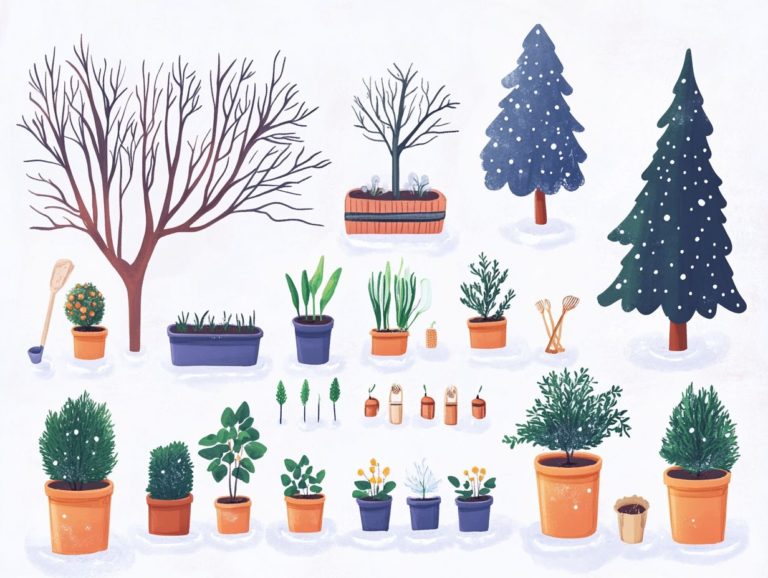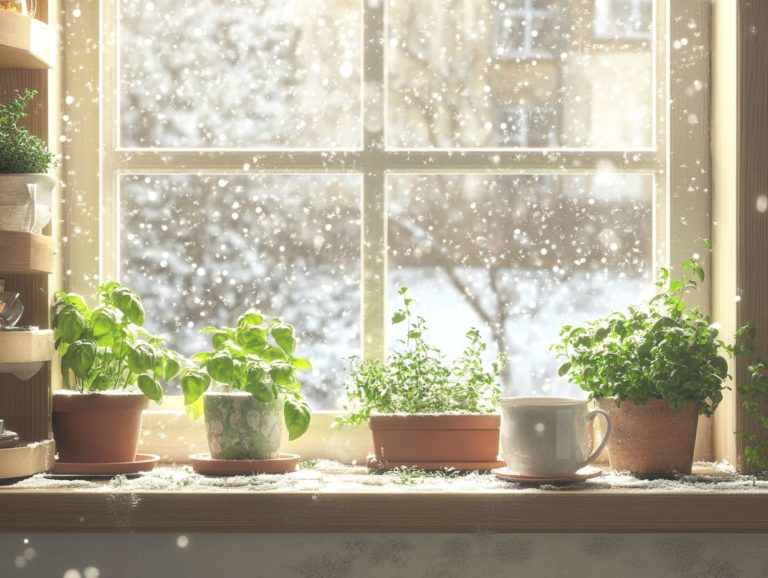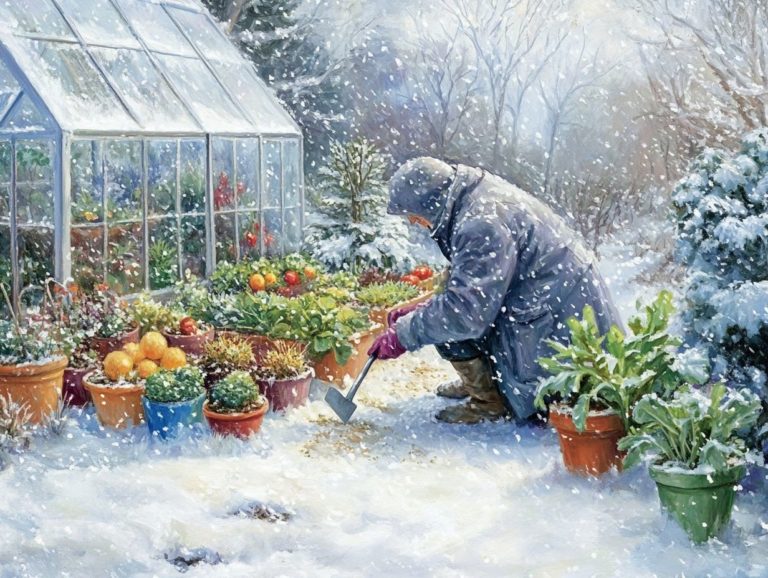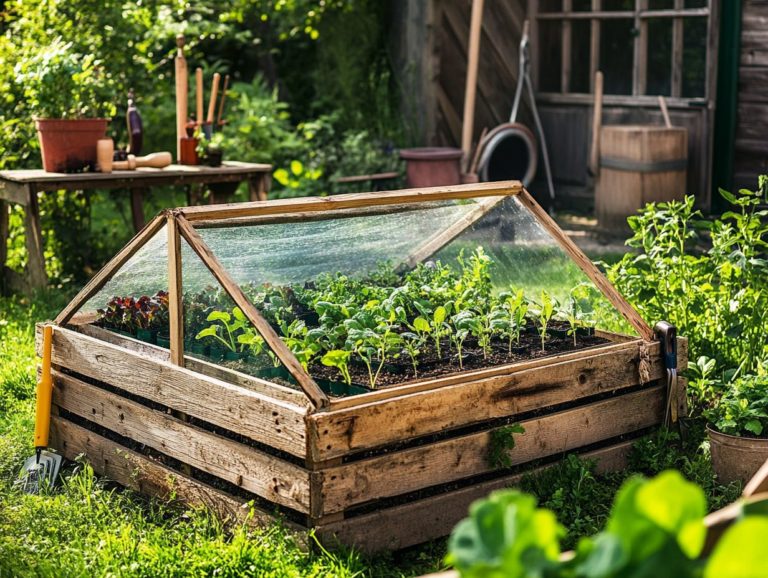Best Winter Gardening Practices for Beginners
Winter gardening may seem daunting at first, but it presents a remarkable opportunity to cultivate strong plants and maintain a flourishing garden throughout the year.
This guide explores the many benefits of winter gardening, not just for your plants, but also for your overall well-being. You ll discover how to select the right hardy varieties and master essential preparation techniques to create a successful winter garden.
We ll also spotlight common pitfalls to avoid, ensuring you can confidently nurture your green thumb even in the chillier months.
Get ready to uncover the exciting world of winter gardening today!
Contents
- Key Takeaways:
- Benefits of Winter Gardening
- Choosing the Right Plants for Winter Gardening
- Preparing Your Garden for Winter
- Winter Gardening Tips for Beginners
- Common Winter Gardening Mistakes and How to Avoid Them
- Frequently Asked Questions
- What are the best winter gardening practices for beginners?
- How can I protect my plants from frost during the winter?
- Why is proper drainage important for winter gardening?
- What should I do with my garden during the winter?
- Can I still plant vegetables in the winter?
- How often should I water my plants during the winter?
Key Takeaways:
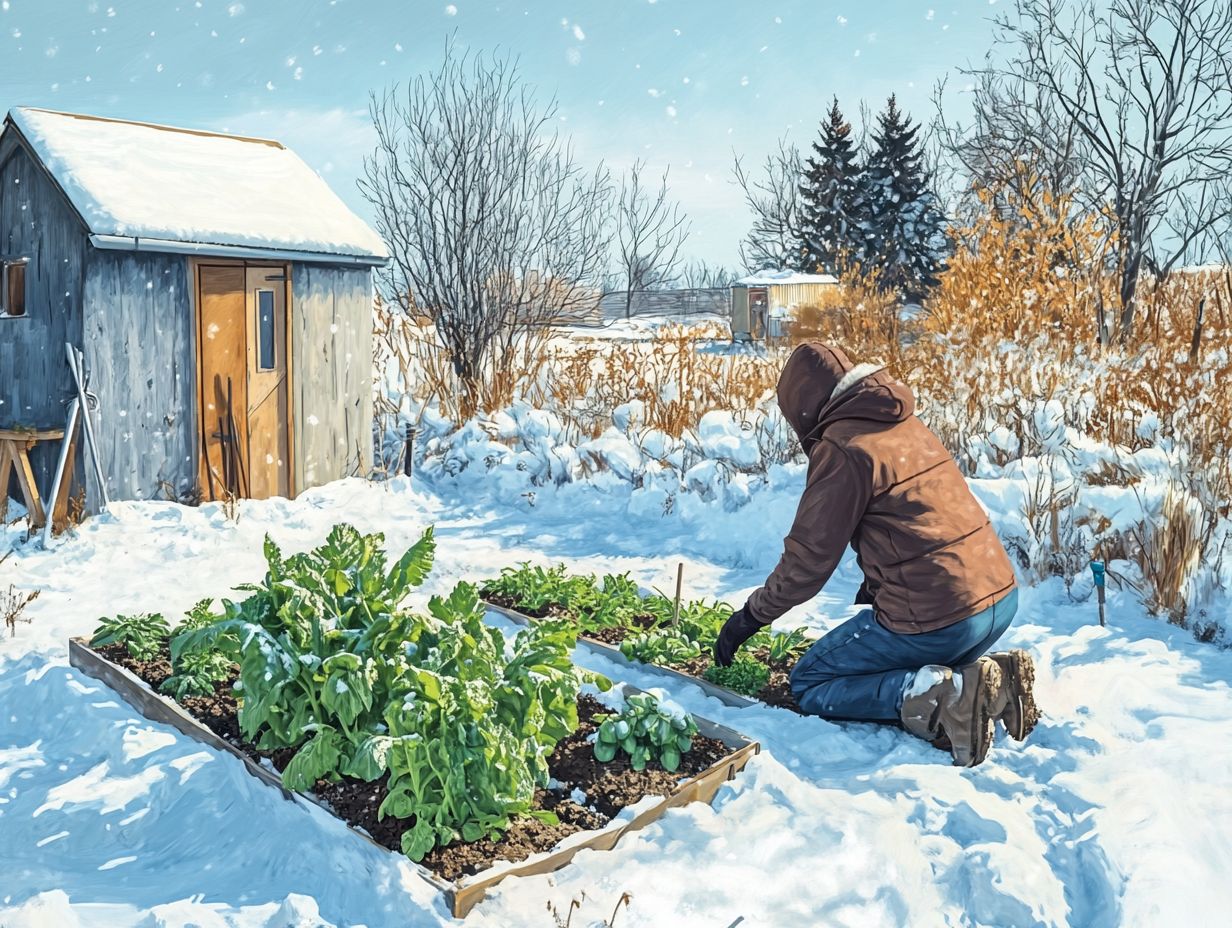
- Winter gardening is rewarding for both plants and gardeners.
- Selecting hardy plants and proper preparation are keys to success.
- Consider factors like temperature, sunlight, and moisture; avoid mistakes like overwatering.
What is Winter Gardening?
Winter gardening invites you to cultivate a vibrant array of plants during the cold season, using various techniques that keep your garden flourishing despite harsh weather. Imagine enjoying homegrown vegetables, leafy greens, and root crops while the world outside is blanketed in snow.
By mastering the essentials of winter gardening, such as soil testing to check nutrients and strategic planting schedules, you can not only survive but develop a winter gardening routine to thrive in this challenging season.
This approach yields fresh produce and promotes environmental sustainability and enhances food security. Consider using tools like greenhouses or cold frames to protect your delicate seedlings from frost, extending your growing season and maximizing your harvest potential.
Engaging in winter gardening is not just about plants; it s a joyful escape that connects you to nature and lifts your spirits during the cold months. With each sprout and harvest, you ll feel a profound sense of accomplishment.
Benefits of Winter Gardening
The benefits of winter gardening go far beyond simply growing food; they offer a wealth of advantages for your mental health and emotional well-being, especially for those facing Seasonal Affective Disorder (SAD).
Immersing yourself in winter gardening can significantly ease the symptoms of SAD. It fosters a profound sense of purpose and a meaningful connection to nature. You ll enjoy fresh, organic produce throughout winter, enhancing your self-sufficiency and promoting a healthier lifestyle.
Advantages for Plants and Gardeners
Winter gardening offers distinct advantages, creating a unique ecosystem that supports both plant health and your productivity as a gardener. By focusing on nutrient-rich soil and embracing various crop types, you can cultivate strong plants that thrive in the cold.
This thoughtful approach allows you to manage your workload more effectively through growing in phases and preserving crops, turning your gardening experience into something more efficient and rewarding.
This resilience minimizes the risk of diseases that often affect non-winter crops, while also enhancing growth rates during milder months. The result? A robust garden bursting with fresh greens and vibrant colors that elevate your spirits even on the dreariest of days.
Furthermore, the biodiversity encouraged by winter gardening attracts beneficial insects, which play a key role in natural pest control. For those who prioritize sustainability, these practices maintain ecological balance and ensure that your gardening efforts yield not just food, but also a rich and thriving habitat.
Choosing the Right Plants for Winter Gardening

Selecting the right plants for winter gardening is vital for maximizing your garden’s productivity during the colder months. By opting for hardy plants like leafy greens and root vegetables such as carrots and garlic, you can secure a bountiful harvest, even in the face of low temperatures and limited daylight.
Familiarizing yourself with seasonal planting schedules and the various crop varieties will empower you to make informed choices about which plants to cultivate. This knowledge significantly enhances your chances of success.
Hardy Plants and Seasonal Varieties
When it comes to winter gardening, choosing hardy plants and seasonal varieties is crucial for a successful harvest. Consider winter lettuce, broccoli, and spinach; these plants can withstand the cold and provide fresh produce even in winter.
With the right gardening gloves and protective measures, you can help your plants thrive during this challenging season. Along with these staples, kale and Swiss chard are well-regarded for their durability, offering both nutrition and flavor throughout the colder months.
Don’t overlook root vegetables like carrots and beets. They re fantastic for storage and can be harvested as needed, giving you great flexibility in your meal planning.
If you’re starting winter gardening, knowing each plant’s specific requirements, like the right amount of sunlight and soil temperature, is key! For those interested in winter-sowing techniques, implementing proper mulching and using row covers can significantly boost crop resilience.
This ensures that even under frosty conditions, your garden remains a vibrant source of produce.
Preparing Your Garden for Winter
Preparing your garden for winter requires a thoughtful approach. This ensures your plants thrive through the cold months. Begin by testing the soil to evaluate its nutrient levels.
This will allow you to implement effective composting methods that enrich and rejuvenate the earth. It creates a fertile haven for winter crops.
You should also think about creating protected outdoor spaces like greenhouses or polytunnels. These offer additional safeguards against harsh winter weather, ensuring your plants remain healthy and resilient.
Essential Steps and Techniques
Implementing essential steps and techniques is crucial for your winter gardening success. Learning how to start your winter gardening early ensures your plants not only survive but truly thrive during the colder months.
Techniques such as hardening off seedlings, which means gradually introducing young plants to outdoor conditions, and proper transplanting can significantly bolster plant resilience.
Planning for winter sowings and employing effective crop preservation methods will extend your gardening season and maximize your yields. Using cold frames and row covers will protect your delicate plants from frost while still allowing sunlight to nourish them.
Additionally, mulching provides insulation for the roots and maintains optimal soil moisture levels. Selecting cold-hardy varieties ensures that your chosen plants can endure harsher temperatures while delivering a bountiful harvest.
Regularly monitoring and adjusting your care routines as the weather fluctuates will help you navigate specific winter challenges. This ultimately fosters a flourishing garden environment.
Winter Gardening Tips for Beginners

Winter gardening tips for beginners are invaluable for cultivating confidence and guarantee a fulfilling gardening experience during the colder months. For those looking to enhance their skills, exploring cold-weather crop care can be particularly beneficial.
Focus on managing your workload by embarking on manageable projects. You can also utilize indoor lighting for seed starting when the need arises.
Investing in high-quality gardening gloves and tools will significantly enhance both your comfort and efficiency as you tackle gardening tasks.
Don t wait! Get started on your winter gardening journey today and share your experiences or ask any questions you might have!
Important Considerations and Advice
When you embark on winter gardening, several key considerations and pieces of advice can significantly enhance your success. For instance, checking out tips for sustainable winter gardening can help you effectively manage your workload while understanding how to maintain nutrient retention in the soil. Be mindful of bolting growth in certain plants, as this can impact your overall yield during the cold season.
To tackle these challenges, select cold-hardy crops that are less prone to bolting. Crops like kale and Brussels sprouts thrive in lower temperatures. Utilizing row covers or cloches creates a favorable microclimate, helping with temperature regulation. Another crucial aspect is soil management; regularly testing for pH and nutrient levels is vital.
Understanding NPK (nitrogen, phosphorus, potassium), key nutrients for plants, can promote healthier growth during winter. Cultivating resilience and flexibility in your practices will empower you to navigate the winter season with greater confidence.
Common Winter Gardening Mistakes and How to Avoid Them
Identifying common winter gardening mistakes and learning how to sidestep them can significantly enhance both your gardening outcomes and emotional well-being. Many gardeners inadvertently encounter challenges like inadequate crop preservation, poor plant selection, or resource mismanagement during the winter months.
Troubleshooting these pitfalls can help you cultivate a more productive and enjoyable winter gardening experience.
Troubleshooting and Problem-Solving
Identify Problems Early
Effective troubleshooting techniques are essential for navigating the unique challenges that winter gardening presents, especially regarding selecting vegetables and maintaining nutrient retention in the soil. By honing your ability to identify issues early and utilizing beneficial organisms, you can mitigate potential setbacks and cultivate a healthier garden environment throughout the colder months.
Enhance Soil Health
The subtleties of winter gardening often demand a nuanced understanding of plant needs and environmental variables. Regularly assessing soil conditions is crucial; ensure it retains moisture while also allowing for adequate drainage to prevent freezing. Utilizing the right essential tools for winter gardening success can further enhance your gardening efforts.
Prioritizing soil health is non-negotiable. Incorporating organic matter enhances nutrient availability and promotes the growth of beneficial microbes. Embracing companion planting techniques establishes a harmonious relationship among your plants, naturally deterring pests.
By cultivating a resilient ecosystem filled with diverse flora, you will not only tackle common challenges but also elevate the overall vitality of your garden, paving the way for a bountiful harvest come spring.
Frequently Asked Questions
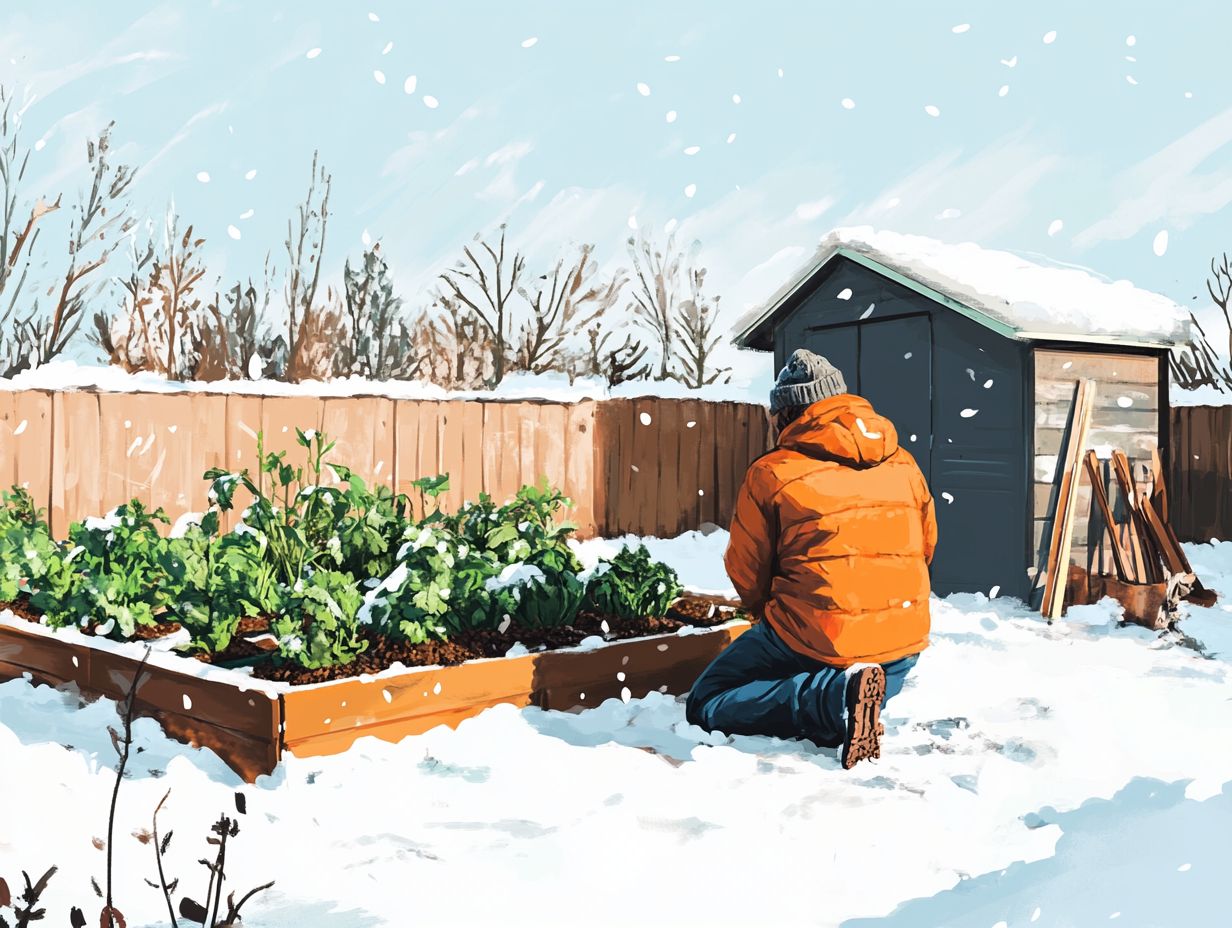
What are the best winter gardening practices for beginners?
Some of the best winter gardening practices for beginners include protecting plants from frost, providing proper drainage, and avoiding overwatering.
How can I protect my plants from frost during the winter?
To protect your plants from frost, use materials such as blankets, sheets, or plastic covers to create a barrier between the plant and the cold air. Moving potted plants indoors or to a sheltered area is also effective.
Why is proper drainage important for winter gardening?
Proper drainage is crucial for winter gardening because excess water can freeze and damage plant roots. Ensure your garden beds have adequate drainage and avoid overwatering plants.
What should I do with my garden during the winter?
During the winter, it’s important to clean up your garden by removing dead plants and debris. You can also plant cold-hardy vegetables and cover them with mulch or row covers for protection, utilizing essential cold-climate gardening techniques.
Can I still plant vegetables in the winter?
Yes! Get ready to plant some amazing cold-hardy vegetables, such as kale, Brussels sprouts, and carrots, which can be planted in the late fall and harvested throughout the winter season.
How often should I water my plants during the winter?
The frequency of watering varies depending on the weather and the plant’s needs. Generally, water plants when the top inch of soil is dry, but be careful not to overwater as this can lead to root rot in colder temperatures.
Ready to transform your winter garden? Start planning today! Check out our guide on overcoming winter gardening challenges. What are your favorite winter gardening tips? Share with us!

